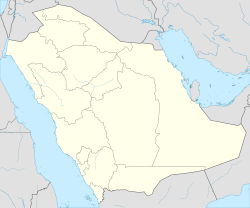Al-Jawf, Saudi Arabia
|
Sakakah سكاكا |
|
|---|---|
| Location in Saudi Arabia | |
| Coordinates: 29°58′11″N 040°12′00″E / 29.96972°N 40.20000°ECoordinates: 29°58′11″N 040°12′00″E / 29.96972°N 40.20000°E | |
| Country |
|
| Province | Al Jawf |
| Area | |
| • Total | 100 km2 (40 sq mi) |
| Elevation | 566 m (1,857 ft) |
| Population (2010) | |
| • Total | 242,813 |
| • Density | 2,400/km2 (6,300/sq mi) |
Sakakah (Arabic: سكاكا) is a city in northwestern Saudi Arabia and is the capital of Al Jawf Province. It is located just to the north of the An Nafud desert. Sakakah had a population of 242,813 at the 2010 Census.
Sakakah is an oasis town on an ancient caravan route across the Arabian peninsula.
Many areas of Saudi Arabia are struggling to develop and modernize in a short span of time. In recent years, the Saudi government has been providing more seed capital to Al-Jawf region, especially in Sakaka in hopes of developing the economically starved region of the kingdom. For this reason, the city is full of new government buildings, schools & hospitals and are built adjacent to crumbling ruins of older buildings that are in dire need of repair. One major feature of the city is the rapidly expanding Al Jouf University (Jami'at Al-Jawf), founded in 2005. Sakaka is a small but expanding city with lots of construction in progress. A big ongoing project is the 1,000-bed Prince Muhammed Bin Abdulaziz Medical City which is under construction.
In 2014 there were reports of mistreatment of foreign workers in Sakaka. These including bodily assaults, overwork and denial food to the foreigners from their former employers.
The King hopes that Al Jouf University will become a pillar of social, cultural, and intellectual advancement in Saudi Arabia. There are several government-run schools and some private schools. The city has Three English schools,Sakaka International School, which is an Indian School and has CBSE curriculum, the other Al-Jouf International school with British curriculum and the third one is Alqimam international school with American curriculum.
The city is served by Al-Jawf Airport which has domestic flights and flights to some of the major cities in the Middle East.
Al-Jawf is notable for its abundant agricultural water, making possible the cultivation of dates (200,000 Palms) and olives (12,000,000 trees), as well as other agricultural products. Farms number around 16,000, and agricultural projects around 1,500. It is the home of some agribusiness farms such as Watania Farms, the largest organic farm in the kingdom. The fertile agricultural land of Al-Jawf is due largely to underground water, which drew delegates of King Abdul Aziz. They were sent to the town of Sakaka and Dumat Al-Jandal and Qurayat, requesting resident tribes there to join the nascent kingdom. Sakaka is home to many Saudi families that can proudly trace their lineage to a few large, old tribes that have dominated the area since time immemorial.
...
Wikipedia

